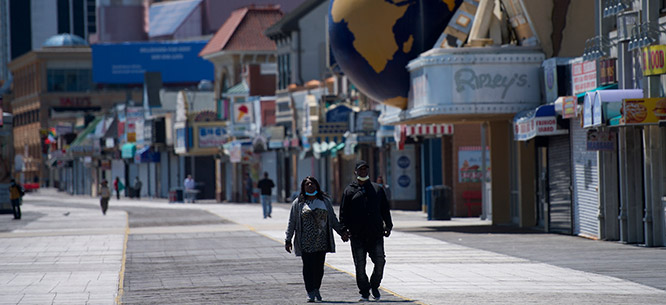Atlantic City’s Streak of Bad Luck
Atlantic City’s Streak of Bad Luck
“We want the casino to open,” says a server at Caesars. “I want to go back to work. But they have to do it responsibly.”

[contentblock id=coronavirus]
Before the coronavirus crisis hit the Jersey Shore, Jeff Payne was spending his evenings with the high rollers at Caesars in Atlantic City. The veteran server poured free libations and served fancy dinners to the casino-goers, who sank eye-watering sums of money into the slot machines for the privilege of membership at a high rollers’ lounge. Then in mid-March, the casino workers’ bad luck streak began.
There was a grim atmosphere overhanging the strip as the basketball season was abruptly canceled and public panic about COVID-19 intensified, so the closure did not come as a total surprise. “I knew things would get really serious,” he said. “I kind of knew it was going to hit the fan.”
Payne has now been out of work for more than two months. A few weeks ago he visited Atlantic City and was stunned at how quiet it was. “It was a ghost town. It was like something out of a movie,” he said. “I was really shocked at seeing it like that.”
Payne noted that Atlantic City had taken hits before, like when Superstorm Sandy devastated the city in 2012. But even then, the casinos reopened within days, and business returned within several months. “But this pandemic is going to be like nothing we’ve ever seen before.”
Currently, Payne is furloughed, so he will be allowed to resume his job when the casinos reopen. But he remains wary of the health risks.
“I will be brought back when we do reopen,” he said. “However, that doesn’t mean I’m going to go in, because they have to be able to open these casinos responsibly. And just because they’re open doesn’t mean it’s going to be safe.”
Payne’s union, UNITE HERE Local 54, has called on employers to adhere to a set of guidelines it has developed for gaming, hotel, and food service workplaces. The recommendations include health screenings for all workers; ensuring that facilities are sanitized and workers are able to consistently “maintain a six foot separation from each other” (or to stagger shifts to avoid overcrowding); providing workers with free COVID-19 testing prior to returning to work; and establishing “a committee of managers and worker representatives” to monitor and address COVID-19 health hazards.
Caesars Entertainment has posted its own safety guidelines on its website, mainly focused on cleaning, encouraging social distancing among customers, and promoting hand washing and sanitizing at its facilities. But the company had not responded to the union’s request to meet with management about the reopening plans, according to Payne. Workers had pressed the company to work with the union to
put together a small committee—only two or three people—to walk around with the people that have put these policies in place with us, so we can give our input [on] what would best work for us in our environment. Because . . . they might think [their reopening plans] might work, but I’m the one that’s actually there, and I have more knowledge of what would be more suitable for me. . . . We want the casino to open. I want to go back to work. But they have to do it responsibly.
Payne also worries that the management might allow customers to flout the safety guidelines. A few months in, he said, “they might ease up. Some of the bigger players might come in, and of course, they’re going to treat them with kid gloves and let them do what they want.” At his lounge, for example, the dynamics of infection control can be tricky when dealing with customers and free-flowing alcohol. “Things can get dicey when people are drinking,” he said. “We have to make sure to handle that. You take your mask off when you’re eating and drinking, but if you’re feeling good, you might not want to put your mask back on when you’re moving around the room.” Mask wearing should be mandatory for customers, he added, and there should be an enforcement mechanism for the safety rules—such as the Casino Control Commission, a state agency that oversees gaming establishments.
In addition to safety guarantees, employees want Caesars to do more to take care of its workforce. Workers like Payne have been getting by on unemployment benefits, while Caesars, a global conglomerate that raked in $4.85 billion in 2017, has only provided two weeks pay for furloughed workers, in addition to running a food drive for its neediest employees. If the lockdown drags through the summer, the union’s healthcare plan could eventually be jeopardized, because workers must put in the requisite hours to maintain eligibility.
With once-stable union jobs thrown into disarray, workers’ fortunes now hinge on the revival of the Monopoly City. “We’ve seen the worst of days and we’ve seen the best of days,” Payne said, “and now we’re back to the worst of days again. But at the end of the day, I’m confident that we’re going to come back. Atlantic City is resilient.”
Michelle Chen is a member of Dissent’s editorial board and co-host of its Belabored podcast.




